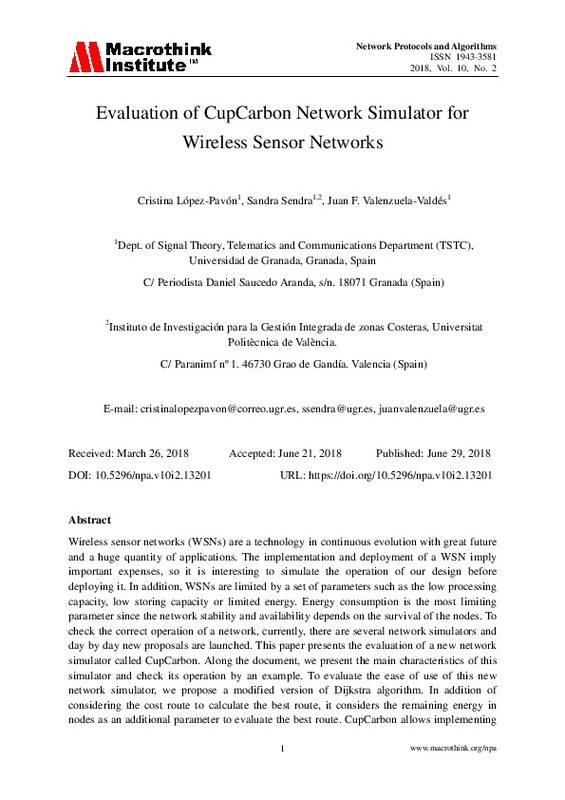JavaScript is disabled for your browser. Some features of this site may not work without it.
Buscar en RiuNet
Listar
Mi cuenta
Estadísticas
Ayuda RiuNet
Admin. UPV
Evaluation of CupCarbon Network Simulator for Wireless Sensor Networks
Mostrar el registro sencillo del ítem
Ficheros en el ítem
| dc.contributor.author | López-Pavón, Cristina
|
es_ES |
| dc.contributor.author | Sendra, Sandra
|
es_ES |
| dc.contributor.author | Valenzuela-Valdés, Juan F.
|
es_ES |
| dc.date.accessioned | 2021-01-12T04:31:56Z | |
| dc.date.available | 2021-01-12T04:31:56Z | |
| dc.date.issued | 2018 | es_ES |
| dc.identifier.issn | 1943-3581 | es_ES |
| dc.identifier.uri | http://hdl.handle.net/10251/158680 | |
| dc.description.abstract | [EN] Wireless sensor networks (WSNs) are a technology in continuous evolution with great future and a huge quantity of applications. The implementation and deployment of a WSN imply important expenses, so it is interesting to simulate the operation of our design before deploying it. In addition, WSNs are limited by a set of parameters such as the low processing capacity, low storing capacity or limited energy. Energy consumption is the most limiting parameter since the network stability and availability depends on the survival of the nodes. To check the correct operation of a network, currently, there are several network simulators and day by day new proposals are launched. This paper presents the evaluation of a new network simulator called CupCarbon. Along the document, we present the main characteristics of this simulator and check its operation by an example. To evaluate the ease of use of this new network simulator, we propose a modified version of Dijkstra algorithm. In addition of considering the cost route to calculate the best route, it considers the remaining energy in nodes as an additional parameter to evaluate the best route. CupCarbon allows implementing our proposal and the results show that our proposal is able to offer a more stable network with an increase of the network lifetime of the 20%. Finally, to extract some conclusions from our experiences, we compare the characteristics and results of CupCarbon with the most common network simulators currently used by researchers. Our conclusions point out that CupCarbon can be used as a complementary tool for those simulators that are not able to monitor the energy consumption in nodes. However, it needs some improvements to reach the level of functionality of the most used simulators. CupCarbon could be an interesting option for academic environments. | es_ES |
| dc.language | Inglés | es_ES |
| dc.publisher | Macrothink Institute | es_ES |
| dc.relation.ispartof | Network Protocols and Algorithms | es_ES |
| dc.rights | Reconocimiento (by) | es_ES |
| dc.subject | Wireless Sensor Networks (WSN) | es_ES |
| dc.subject | CupCarbon | es_ES |
| dc.subject | Dijkstra | es_ES |
| dc.subject | Energy efficiency | es_ES |
| dc.subject | Network Simulator. | es_ES |
| dc.subject.classification | INGENIERIA TELEMATICA | es_ES |
| dc.title | Evaluation of CupCarbon Network Simulator for Wireless Sensor Networks | es_ES |
| dc.type | Artículo | es_ES |
| dc.identifier.doi | 10.5296/npa.v10i2.13201 | es_ES |
| dc.rights.accessRights | Abierto | es_ES |
| dc.contributor.affiliation | Universitat Politècnica de València. Departamento de Comunicaciones - Departament de Comunicacions | es_ES |
| dc.description.bibliographicCitation | López-Pavón, C.; Sendra, S.; Valenzuela-Valdés, JF. (2018). Evaluation of CupCarbon Network Simulator for Wireless Sensor Networks. Network Protocols and Algorithms. 10(2):1-27. https://doi.org/10.5296/npa.v10i2.13201 | es_ES |
| dc.description.accrualMethod | S | es_ES |
| dc.relation.publisherversion | https://doi.org/10.5296/npa.v10i2.13201 | es_ES |
| dc.description.upvformatpinicio | 1 | es_ES |
| dc.description.upvformatpfin | 27 | es_ES |
| dc.type.version | info:eu-repo/semantics/publishedVersion | es_ES |
| dc.description.volume | 10 | es_ES |
| dc.description.issue | 2 | es_ES |
| dc.relation.pasarela | S\385772 | es_ES |








